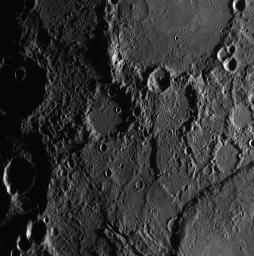When MESSENGER flew by Mercury on January 14, 2008, the Mercury Dual Imaging System (MDIS) snapped images of a large portion of Mercury's surface that had not been previously seen by spacecraft. On these images, new examples of long cliffs were identified and viewed for the first time. This image, taken by the Narrow Angle Camera (NAC), shows one of those cliffs in the bottom right corner. The cliff can be followed from the bottom edge of the image, cutting through and deforming an impact crater, and curving out of the image frame on the middle right edge. This cliff is the northern continuation of the cliff visible in the images previously released on January 16 (PIA10174) and January 27 (PIA10194). This image shows an area of Mercury's surface about 200 kilometers (125 miles) across, and by tracing this cliff through the three images, it can be seen that it extends for hundreds of kilometers.
Cliffs that mark geologic escarpments on Mercury are called "rupes," which is simply the Latin word for cliff. On Mercury, rupes are named after the ships of famous explorers, and names include Discovery Rupes, for a ship of Captain Cook, Santa Maria Rupes, for a ship of Christopher Columbus, and Victoria Rupes, for a ship of Ferdinand Magellan. (The word rupes is both singular and plural). The MESSENGER team proposed to the International Astronomical Union, which has the final say on all names of landforms on planets and satellites, that this cliff be named the Beagle Rupes, after the ship on which naturalist Charles Darwin sailed around the world. Today the MESSENGER team received word that the proposed name has received formal approval.
Image Mission Elapsed Time (MET): 108827037
These images are from MESSENGER, a NASA Discovery mission to conduct the first orbital study of the innermost planet, Mercury. For information regarding the use of images, see the MESSENGER image use policy.

 Planetary Data System
Planetary Data System












